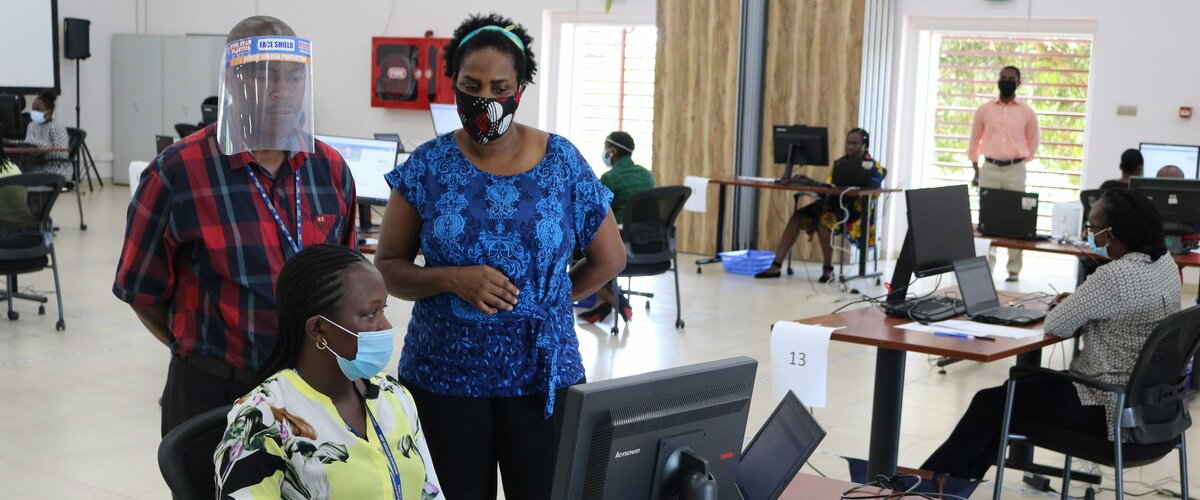GGST: the COVID-19 Edition
On Friday 2 October, the first session of many to come of the Global General Service Test (GGST) took place at the Regional Service Centre Entebbe (RSCE). The GGST is a computer-based test which assesses job-relevant abilities and core competencies of long-listed applicants for General Service (GS) positions. Due to the COVID-19 pandemic, this year’s testing round is being organized under strict safety measures.
The Kofi Anan Hall of The Regional Training and Conference Centre (RTCC) – the venue where the GGST is held - underwent quite the extreme make-over to be able to examine candidates safely. The main entrance of the RTCC building has been closed, and applicants had to enter through a side entrance. Once inside, they needed to follow a corridor where, at the end of it, they were invited into a spacious waiting room. Should the main entrance have been accessible as per usual, there was a risk of creating a logjam of people in the main hallway, facing the impossibility of respecting a physical distance.
Several other social distancing methods were equally put in place to ensure a sound, infection-free farness from one another. Colourful markers were glued on the floor indicating where test takers should stand to queue for getting inside the examination room. The 40 or so individual computer stations in the Kofi Annan Hall were scattered all over to maximize spacing in between them.
Besides social distancing, other precautions were taken to limit the chance of the virus thriving within the walls of the RTCC. Both the test-takers as well as the GGST invigilators and facilitators need to wear their face masks correctly at all times before, during and right after the test as long as they are on the RSCE premises. The facilitators also made sure that the more than 40 computer stations were all thoroughly sanitized, including the PC, mouse, keyboard as well as the desk and chair. Once sanitized, the computer stations were not touched by any other person until the different applicants taking the test were allocated to their respective computer stations.
This first session of the GGST during corona times can almost be considered as a trial because only internal colleagues were invited to partake. As it speaks for itself, access to the base is easier given to those that already have a United Nations ID in their possession. Current colleagues are also aware of the existing safety arrangements on the Entebbe Support Base (ESB). By inviting only RSCE colleagues for the first couple of sessions, sign-in timelines and ‘corona measures’ were tested so that during the coming weeks future GGST sessions with external applicants can be anticipatedly arranged even better so.
The GGST sessions will be taking place every Wednesday and Friday in the coming weeks. External candidates will be invited at the RSCE to take the test from the 2nd week of October and onwards.
The coordination of the GGST has been a joint tour-de-force by colleagues from several RSCE Service Lines. While the RSCE Human Resources and Talent Management Unit (HRTMU) oversees the management of the applicants and the conduction of the test itself; the team of the RTCC made sure that all the computers were set-up in the right place, connected and ready to be used for the test. In addition, Field Technology Services (FTS) used their IT know-how to solve technical issues in a matter of seconds. RSCE can make the tests happen second to none, even under Covid-19.
Also other non-RSCE entities were involved, including the office of the UN Uganda Resident Coordinator, the Ugandan Ministry of Health as well as the World Health Organization (WHO) who is represented locally by our ESB Medical Team. Organizing the GGST while respecting the COVID-19 guidelines is not a walk in the park. Thanks to the valuable advice and continuous support of those aforementioned partners, the RSCE teams are able to provide a sound and tested GGST standard procedure to avoid exposure to the virus to all stakeholders.
Some more information about the test itself: the GGST is a computer-based, proctored global test. It is an entry-level assessment requirement for recruiting into the positions in the GS category. The GGST assesses job-relevant abilities and core competencies of the long-listed applicants for GS positions, through work-relevant scenarios and tasks, in an efficient, effective, and fair manner. There are three sections, each of which assesses a candidate’s ability to deal with a particular aspect of typical GS-related tasks: a verbal reasoning, a numerical reasoning and a situational judgment section.
For more information about the GGST, please click here.
 UN
UN United Nations Peacekeeping
United Nations Peacekeeping


